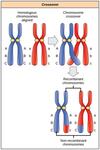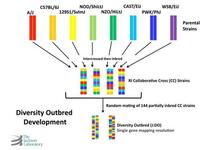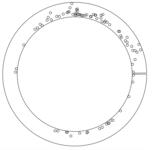Spider
HEY Y'ALL I'M GONNA DO A SCIENCE RAMBLE 
Spider
because I am a couple weeks out from my next project update meeting for my phd
Spider
and I also just took an imitrex because my head is trying to destroy me again, so WHY NOT YELL ABOUT MY PROJECT AND HOW COOL GENETICS CAN BE
Spider
SO
Spider
genetics! People studying DNA, the genes encoded in DNA, doing MEDICINE THINGS to fix DNA SADNESS
Spider
I don't do that
Spider
at least, not directly
Spider
I do what's sometimes referred to as "basic genetics research": while everybody else is focusing on "we found a bit that makes bad stuff happen when it's broken", I'm trying to figure out "okay but what does un-broken look like anyway, and how the fuck does it work"
Spider
because that's the whole goal, right? To figure out how stuff works. Turns out that can be harder than studying how something breaks.
Spider
Especially with lab animals and petri dishes full of cells. Those tend to be inbred or isogenic: they're standardized so that every one of them is pretty much the same.
Spider
This is really useful for a lot of things! If you want to test one specific thing, like. "Does this drug make mice sing Ode To Joy", you can give the drug to some mice, and compare them to other identical mice that haven't gotten the drug
Spider
And if some of the little drugged up bastards start singing, but the sober ones don't, hurray! You have proven that your drug is in fact making the mice sing Ode To Joy, and not some quirk of one mouse's unique genetics that's turned it into an opera star.
Spider
and if anybody else wants to check your work, they can order some genetically identical lab mice and do the same test again. If they get the same result, your findings are "reproducible", and that's great!
Spider
This also lets you study what specific changes to DNA do. If you altered one gene in some of these identical mice, and they started singing Ode To Joy, well then! You have found the Ode To Joy gene. Or one of them, at least, there might be lots of them working together oh god genetics is a hilarious tangled ball of string and unintended consequences
Spider
Third option: give the mice the drug, and then watch what their cells do with their DNA.
Spider
Because DNA by itself doesn't do all that much. It doesn't go out and make things, it's a great big complicated instruction book that tells the rest of the cell how to make things.
Spider
And cells can, by various mechanisms, decide how much they want to make any given thing that's written down in the DNA.
Spider
This process is called transcriptional regulation, because the first step cells take when going from DNA instruction book to actual useful product is copying down (or "transcribing") those instructions.
Spider
So! Genes are little instructions on how to do things. If you give a drug to a lab animal or cells in a petri dish, and then see a gene being transcribed more or less as a result, then you know that something about the drug is affecting that gene.
Spider
What I've described are all pretty standard ways that genetics work gets done.
Spider
...I don't do these things
Spider
See, one of the problems that people eventually became aware of with inbred animals and petri dishes of isogenic cell cultures: You can have a fantastic result in your experiment, but sometimes when you try and apply it out in the wild, everything falls apart.
Spider
Ever been prescribed a medication and it did fuck-all for you? Or just made things worse? Genetics is partially to blame!
Spider
A medication can work wonders in some people who have certain genetic sequences, and be absolutely toxic to people with other sequences.
Spider
We call these differences in genetic sequences "variants", and natural populations of critters are full of variants.
Spider
While humans are relatively more genetically similar to each other than most species, there's still an average difference of about 20 million letters of different DNA between any two random people.
Spider
The total number of variants in the human population, from the most common to the rarest of the rare, comes to 324 million variants.
Spider
That includes changes from single letters all the way up to the deletion or copying of entire chromosomes.
Spider
So, in recent years, there's been a big push in some places to try and study more genetically diverse cell cultures and lab animals too!
Spider
...But that doesn't mean we're, like, going out in a field somewhere and catching mice
Spider
(though some people do that for ecological and evolutionary studies!)
Spider
The problem with wild critters - and humans - is that you have no idea what grab bag of genetics you're working with. You have to sequence their entire genome to find out, and that's still expensive.
Spider
(yes, you can get your DNA analyzed for under $1,000. What they're doing is looking through the areas of your genome where you're most likely to see differences, not all of your genome.)
Spider
My institution mostly works with mice and cell cultures derived from mice. We are the kings of this. We have a shitton of different kinds of standardized mice that have been made over the decades, and we know their genetics really well. We have sequenced the shit out of those genomes
Spider
So somebody at the lab started a project where they took eight really well-understood types of mice and started randomly breeding them together.
Spider
What this does is it mixes their DNA more and more over multiple generations, creating smaller and smaller chunks of DNA that have gotten swapped around.
Spider
 This is called recombination, and at its most basic, it's like this.
This is called recombination, and at its most basic, it's like this.
Spider
You get a pair of chromosomes, one from each parent. When making an egg or a sperm, the pairs line up and swap pieces. One of these chromosomes will get passed on.
Spider
 so we made that happen with our mice: breed different mice together, they pass down a chromosome to the bb mouse, DNA recombines, mouse passes on a chromosome to a bb mouse, recombine, again and again and again
so we made that happen with our mice: breed different mice together, they pass down a chromosome to the bb mouse, DNA recombines, mouse passes on a chromosome to a bb mouse, recombine, again and again and again
Spider
you end up with a funky pair of rainbow chromosomes, both of them different...
Spider
but because we know the DNA of the mice we started this project with, we can do real neat stuff with them
Spider
and for relatively cheap
Spider
We can set up those sorts of situations I described before: Where you give a drug to one person and it works great, but makes somebody else sick
Spider
but we can tell what the genetic differences are that make that happen in these mice.
Spider
Because we know so much about who they are and where they came from, we can tell how differences in genetics translate to differences in response to "environment", meaning "everything that isn't genetics"
Spider
"Environment" could be a drug, diet, how much sleep they get, if somebody's playing Ode To Joy in the room, whatever!
Spider
All of that is real cool... and still not what I'm really looking at!!
Spider
(But it gives you background about the thing I'm doing, so I swear it's all been relevant)
Spider
Fundamentally, organisms with different genetics do stuff differently, right? Some of it's directly because of that difference in genetics, some of it because of the differences in DNA regulation that they might make.
Spider
And that regulation is important. Changes to DNA itself are rare, but changes in DNA regulation are constant. That's how bodies adapt to stuff.
Spider
So regulation is important, but a lot of it is still not super-well understood.
Spider
We know that there's a lot of different types of regulation, and we do know a lot about them, but not how they work together
Spider
and we know where regulation of genes tends to happen: in the DNA close to the gene that's being regulated.
Spider
...But nobody's really gone and figured out what counts as "close to a gene"
Spider
or rather they have, but not why
Spider
I started this project just kind of looking at how two different types of gene regulation interact with each other, and I said "okay, I need to decide where to look for that regulation"
Spider
"because like fuck I'm looking everywhere, that's over 3 billion letters of DNA, fuck that"
Spider
"oh, all these papers are saying to look within 100,000 to 500,000 letters of your gene"
Spider
"....why, tho"
Spider
and nobody actually said why. That was just where they'd found regulatory stuff before!
Spider
So they kept looking there!
Spider
and so I was like "okay hold up, I've got to try and figure this shit out"
Spider
so that's my project! I seem to have found what it is that makes DNA within 100k-500k from a gene important, and the rest of everything less so.
Spider
It's something people knew about before, but didn't really connect the dots on.
Spider
(It's also something that is really fucking hard to prove unless you have a shitton of those rainbow mice like my institution does, so I'm not, like, hiding this stuff. because literally nobody else can prove it like we can)
Spider
SO, SLIGHTLY MORE BACKGROUND:
Spider
DNA is all stuck together in a long string of letters called a chromosome, right?
Spider
But that chromosome isn't just, like. stretched out. That'd take up about 4 cm of space per chromosome, and ain't nobody got space for that shit
Spider
so instead it's all packed and folded and crunched up so small that it's invisible to the naked eye.
Spider
And all that folding and packing and coiling means that bits of DNA are jammed in really close to one another, even if they're on different sections of the chromosome string.
Spider
A lot of that is pretty random, but some of it isn't. Some of it is very stable and predictable.
Spider
And has a really fucking shitty name that makes other geneticists run away in fear, because they have no fucking clue what it means
Spider
The "Topologically Associating Domain". We call them TAD.
Spider
TADs are really predictable, always falling at pretty much the same place, no matter where in the body you're looking, no matter who you're looking at, hell, a lot of them are the same in different species, even
Spider
They're loops of DNA that contain about 1 million letters, which made me think "hey, maybe TADs are where the action is here"
Spider
and I've been looking for the past 3 or 4 years and yeah, seems like
Spider
If a gene's in a TAD, then DNA in that TAD will regulate it, and not so much manages to get in from outside the TAD.
Spider
And not only that, but stuff that's closest within the TAD will regulate it the most. That sounds like a no-brainer, but again, the DNA's tied up in a loop. That brings really distant stuff on the DNA string right up close to your gene sometimes.
Spider
 So, this is a graph I made to day. It's not finished, but I am PROUD of this goddam graph.
So, this is a graph I made to day. It's not finished, but I am PROUD of this goddam graph.
Spider
This is a TAD. There's some genes in it, at approximately 12 o'clock to 2 o'clock, but I haven't got them marked on the graph yet. The little dots are bits of DNA that regulate the genes.
Spider
The break at 3 o'clock is where the DNA loop is pinned together. It starts in there, goes clockwise, and exits the loop back at 3 o'clock. Stretch out the DNA, and the two bits on either side of the gap would be 1,440,000 letters of DNA away from each other
Spider
But as you can see, that doesn't seem to matter. The genes at 12-2 are regulated by stuff way out a million letters away from them, because the loops brought it all in close.
Spider
And with previous analysis methods, people would've missed this kind of thing. Usually they'd start at the genes and go along the string, until they hit that dead zone at 6-9 o'clock and just go "welp there's nothing here, we're done"
Spider
no guys! you're not done! more stuff! more cool science!!
Spider
ANYWAY
Spider
this is my project
Spider
this is why I'm slow on tags these days
Spider
this is why one of my characters is a geneticist
Spider
and I am happy to take any questions and explain stuff because FUCK YEAH SCIENE
Spider
*SCIENCE
Spider

𝚌𝚑𝚞𝚞𝚑𝚞𝚊𝚑𝚞𝚊
SCIENCE
𝚌𝚑𝚞𝚞𝚑𝚞𝚊𝚑𝚞𝚊

Spider
𝚌𝚑𝚞𝚞𝚑𝚞𝚊𝚑𝚞𝚊
: 
𝚌𝚑𝚞𝚞𝚑𝚞𝚊𝚑𝚞𝚊
really interesting science
𝚌𝚑𝚞𝚞𝚑𝚞𝚊𝚑𝚞𝚊
why stuff does stuff!!
𝚌𝚑𝚞𝚞𝚑𝚞𝚊𝚑𝚞𝚊

StupidSexyV⚠der
so interesting!